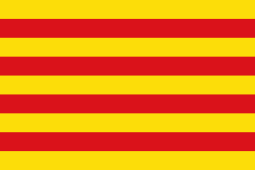Flag of Aragon
 |
|
| Name | Senyera |
|---|---|
| Use | Civil and state flag normal |
| Proportion | 2:3 |
| Adopted | 25 May 1933 |
The Senyera (Eastern Catalan: [səˈɲeɾə], Western Catalan: [seˈɲeɾa]; meaning "pennon", "standard", "banner", "ensign", or, more generically, "flag" in Catalan) is a vexillological symbol based on the coat of arms of the Crown of Aragon, which consists of four red stripes on a golden background. This coat of arms, often called bars of Aragon, or simply "the four bars", historically represented the King of the Crown of Aragon.
The senyera pattern is nowadays in the flag of four Spanish autonomous communities (Catalonia, Aragon, the Balearic Islands, Valencia), and is the flag of the historically Catalan-speaking city of Alghero in Sardinia. It is also used on the coat of arms of Spain, the coat of arms of Pyrénées-Orientales and of Provence-Alpes-Côte d'Azur, the flag of Roussillon, Capcir, Vallespir and Provence in France, one quarter of the coat of arms of Andorra, and on the local flags of many municipalities belonging to these territories. The Senyera (sometimes together with the flag of Andorra) is also used more informally to represent the Catalan language.
...
Wikipedia
